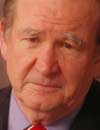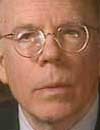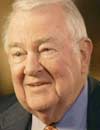- Dan Bartlett
Counselor to President Bush - Patrick Buchanan
Commentator; former adviser to President Nixon - John Carroll
Former editor, Los Angeles Times - James Goodale
First Amendment attorney - John Hinderaker
Blogger, Power Line - John Miller
Assistant director for public affairs, FBI - Scott Johnson
Blogger, Power Line - Bill Keller
Editor, The New York Times - Eric Lichtblau
Reporter, The New York Times - Mark McKinnon
Former media adviser to President Bush - John McLaughlin
Former deputy director, CIA - Edwin Meese
Former attorney general - James Risen
Reporter, The New York Times - Bill Sammon
Reporter, The Washington Examiner - David Szady
Former assistant director of counter-intelligence, FBI
It is a new paradigm in many respects, and it deserves a lot of debate and scrutiny and discussion. Whether it be shield laws that are being debated in the United States Congress or other things, this is a healthy debate for our country.
What do you think about The New York Times reporting a secret program of eavesdropping by the National Security Agency [NSA]?
The New York Times held that story for a year as I understand it, so clearly they had concerns and qualms about whether they would damage the national security by publishing that. I would not have published that in wartime if I were the editor of The New York Times.
While I oppose the war, I don't think you do something like that which would, I think, damage the war effort and the cause for which people are dying. That's a tough call, but I would not have done what the Times did. And I do think the individual that leaked it to the Times, they should be prosecuted and sent to prison.
To some extent, a news organization cannot have a black-and-white rule. They cannot say we will never publish something that's classified, the reason being that classification is sometimes used to cover political problems, and the public interest sometimes demands that that be exposed. Now, the wiretapping of massive numbers of citizens ... deserved to be exposed.
They basically secretly reversed years of the law and years of controversy over government wiretapping of citizens. Can all of that law and all of that concern about the privacy rights we have in our conversations, our thoughts, can all of that be secretly done away with just overnight? I think The New York Times in this case was absolutely right to publish that. ...
I think the NSA eavesdropping case is almost as good a case as the case where Dana Priest wrote about the prisons in Europe for the CIA. I say almost as good because when you look at the polls, 53 or 51 percent of the people seem to think it's OK to tap people with respect to their conversations in this country if they're talking to a terrorist. Now, if, say, half the people think it's OK and half don't, I don't think in human terms it's quite the slam dunk that you have with [secret prisons]. ...
But wait a second now. The New York Times published information about a closely held national security wiretapping program and subsequently, in a separate article, published information about how it was being done, through switches at the telephone company. And you're saying that's legal?
Well, let's look at it from government's point of view. They should make every effort to keep that information closely held; everyone concedes that. But because they can do that doesn't mean that you can't publish it.
You have to ask yourself: "What does that information do to the national security of the United States from a First Amendment point of view? Does it -- the publication -- create a clear and present danger to the United States?" If you think that's a clear yes -- which I don't -- then you're right. But there's nothing in the statute that talks about clear and present danger. There's just a lot of language saying you can't do this, you can't do that. There's no First Amendment within the statute. …
[The law] says, for example, that you cannot publish any classified information about communications intelligence. I'll bet you The Washington Post and The New York Times, the Chicago Tribune, the L.A. Times do that every other day. Any information about communications intelligence? It's a wide, sweeping act. ...
We don't have to protect all speech, and everyone would agree with that general analysis. But look at the government's argument here. They said that by publishing what The New York Times published, that terrorists were alerted that there was a phone program out there tracing their phone calls. You think that comes as a surprise to them? ... They're as smart as we are. I hate to say that. ... If they really wanted to have a secure communication, they would have encoded it. ...
What was your reaction when The New York Times printed their story about the NSA's [National Security Agency] warrantless wiretapping program?
... A lot of damage was done by The New York Times printing that story and by the people in the intelligence agencies leaking that story. One thing about our site, Power Line, is that we're all lawyers, and there are a lot of news stories that involve the law in one way or another.
So this is an example of a story that we have brought our legal training and skills to bear on. One of the things that we've written about -- I think [Power Line co-author] Scott [Johnson] has written about the most extensively -- is the legal issues surrounding those leaks and surrounding the publication of those leaks. We've written about the Pentagon Papers case, which clearly says that newspapers can be criminally prosecuted after the fact if they illegally print national security-related information. We've written about the Espionage Act and whether it has been violated by some of these leaks. I think that in the case of the NSA terrorist surveillance program, there's no serious question about the fact that the leak was a crime. ...
The reporters have said that terrorists know full well they're being monitored; all they revealed was that it was being done without warrants.
The people who try to defend these leaks always try to have it both ways. On the [one] hand, it's a front-page, above-the-fold story that contains the word "secret" 10 or 15 times. It's a big news story, something nobody knew.
On the other hand, when people push back and say, "Wait a minute; you are undermining security by making this information public," they say, "Well, this isn't news; the terrorists already knew about it." Well, you can't have it both ways. ...
There is a leak investigation going on related to NSA's [National Security Agency] warrantless eavesdropping program. So you're aware of this case?
Right. ...
How do you feel about the NSA eavesdropping story? If you were a journalist, would you have done the story?
That's asking me to talk about journalism and politics and hot-button issues. I don't know if I can answer that question without really going off into the corner and thinking about it for a long time. But I would certainly say my first reaction in reading the story was, "Boy, there's an excruciating amount of detail in here," not just about the program's existence, but about the actual mechanics of how it works and what makes it work, and why it functions well in one case and not in another case; the kind of information that your adversaries in terrorism or espionage overseas might look at and say, "Hmm, if I stop doing these three things, can I lower my risk of being identified?"
That's the kind of story that as a reporter -- and I'm not criticizing any individual or saying that my judgment is better than theirs; I'm just saying that my judgment as a reporter would have been to look at that, talk to people and probably say, "Am I serving the public by revealing that level of information about the mechanics of how they listen to people talking overseas?"
So you didn't think it was a responsible story?
I'm reluctant to pass judgment on it in the form of the question you're asking me. Obviously as a government official, the government has taken the position that they want to know who revealed that information and launched an investigation.
As a journalist, I probably would have come to a different judgment. But I wasn't there; I wasn't in those meetings. But again, the standard I used to weigh things on is, is this going to be a good story? Clearly the NSA was going to be a good story. Is it going to hurt the government's ability to keep people safe? That is where the debate is in that story.
One of the reporters, [New York Times national security reporter] Jim Risen, said to us that the only thing revealed in his reporting was that the wiretapping was happening without a warrant. It wasn't news that we were trying to listen to terrorists around the world. That's been known for years, particularly with [Osama] bin Laden. The point of the story was that the president was breaking the law.
And I would refer you, without getting into that, back to the copy and the articles, and more specifically [to] the book that followed that described how the program works, where its capabilities exceed what people once believed in terms of where their conversations were. People have to come to their own judgment on that. That's not the issue here. We can get tangled up in that.
The issue is very simple from the standpoint of the Federal Bureau of Investigation, which is the FBI was referred a case from the Department of Justice to find out what government employee broke the law and violated his or her oath by revealing that level of information. That's not very complicated.
What was your reaction when The New York Times published the story about the NSA surveillance program?
The New York Times disclosed the existence of the National Security Agency enemy eavesdropping program on Dec. 16, 2005, and I read it that morning. ... It seemed to me that the program was probably a very valuable program to protect the United States; that it had served that purpose; that it probably had something to do with the fact that we haven't been attacked for five years in the United States since 9/11. ...
I did research for the next several weeks, wrote about it on our site, came to the conclusion that the Times itself was subject to a highly special provision of the espionage laws: Section 798 of the espionage laws that protects classified communications intelligence, which seemed to be exactly what this was. [There] didn't seem to be any doubt about that. I thought it highly likely that the Times itself had violated that statute, and I was struck by the fact that the Times itself never mentioned that for four or six or eight weeks after that story that it might be in legal jeopardy. Other media organizations seemed not interested in that story.
I began writing to encourage the government to enforce the espionage laws. I thought the Times had seriously damaged the national security of the United States, and I wanted the government to do something about it. ...
[Has the mainstream media seriously evaluated the legality of the Times publishing the NSA wiretapping story?]
... If you want a serious analysis, you have to go to [civil liberties lawyer Harvey] Silverglate and the Boston Phoenix, to Power Line, or the column I wrote on this subject for The Weekly Standard, which is available online on The Weekly Standard Web site, or Gabriel Schoenfeld's Commentary article, which is available online, "Did the New York Times Violate the Espionage Act?" ...
The administration, did they call you up about this [National Security Agency (NSA)] eavesdropping story? ... When did you get invited into the White House?
After we'd done the initial reporting and gotten the story to where we thought it was something we could responsibly publish, we told the administration that we intended to do that. There ensued another round of meetings, including another round with an array of Cabinet-level officials. Then we were told at that meeting that if we persisted in our determination to publish this story, the president might want to talk to me and the publisher about this. And we said, of course we obviously would accept an invitation to hear from the president. ...
The ground rules of the meeting, which we agreed to, were that it would be off the record because the President wanted the opportunity to present us with what he said were classified details about the effectiveness of the program that he thought would persuade us not to publish the article. I'm obviously going to honor our obligation not to talk about anything classified. But the basic fact that the meeting took place, the White House has already talked about. ...
And so [Publisher] Arthur Sulzberger and I went down to the White House, with Phil Taubman, the Washington bureau chief, and we were escorted into the Oval Office. That's my first visit, probably my last visit to the Bush Oval Office. And we met with the president; the national security adviser; the White House counsel; and Gen. [Michael] Hayden, who was then still the head of the National Security Agency, the agency in charge of the eavesdropping program. ...
The president said quite forcefully that this program was something he regarded as part of the crown jewels of our national security, and that if we exposed it, we would be at least in part responsible, or [should] feel ourselves responsible, if there was another attack on the U.S. I think what he said was, "When we were called up to explain to Congress why there was another attack, you should be sitting beside us at the table." ...
When the president said that, did you and Mr. Sulzberger and Mr. Taubman look at each other? I mean, did you gulp?
Look, you take a warning like that very seriously indeed. I mean, it's the president of the United States saying that if you publish this story, you will have blood on your hands. ... I'm paraphrasing, but that was the clear message. He's the commander in chief of the world's foremost military power, and we were sitting in an office that is kind of steeped in history, and I'm sure all of the atmospherics were intended to have the effect that they had, which is that we took it very, very seriously. ... The president had wrapped it up by reiterating that he thought what we were about to do was a mistake.
Would give aid and comfort to our enemies.
Would give aid and comfort to our enemies, yes.
That was the gist of what he said.
Um-hmm.
So as you left the Oval Office, what did you and the publisher and the Washington bureau chief say to each other?
We walked down to the corner ... to catch our taxis in various directions, and I said to the publisher that I wanted to obviously sleep on it and think about what we just heard, but my first impression was I hadn't heard anything there that had changed my mind. And he said he hadn't either. ...
And why didn't he persuade you?
Because in the end I don't believe that that's the case. I don't question the president's sincerity. I'm sure that he felt very strongly that it's important, particularly in perilous times, for the president to have extraordinary powers to defend the country, and that [revealing] the existence of those powers could put them in danger.
But in the end, you can't defer to the government on these kinds of decisions. It may seem odd to ordinary Americans that somebody like me has the power to defy the president of the United States, but in fact, that's the way the inventors of the country set things up, because the alternative was to let the government be the final arbiter of its own flow of information. ...
You were reluctant to publish the story when you first heard about it or you first read a draft of it, I assume. What was wrong with the story initially?
With the original draft of the story, ... I tended to think of it as a story about a secret program, which tended towards intelligence gathering sources and methods, which is a tricky area to get into. You know, as time went on and I thought about it more, talked more to the reporters, it became clear to me this was not really a story about sources and methods. It was a story about warrants. ...
Did the decision to hold the story in any way relate to the 2004 election, that it was actually before the election?
No. We didn't run the story because I didn't think it would be responsible to run the story, and that had nothing to do with the elections. I'll give you just two pieces of evidence that you can consider in deciding whether you want to believe that or not.
A few days before for the election, we published the story about the American military's failure to protect a big cache of weapons and high explosives in Iraq. ... We published that six or seven days, eight days before the election. We were accused of an October surprise, an ambush, but we published it because the story was right; in fact, subsequent reporting by us and others only made that security breach seem even more egregious. ...
And the other point is if we had held the story because of the election, we would have published it a week after or a month after the election. ... There's an interesting question of whether or not publishing it would have made a difference in the election. ... It seems to me you could plausibly argue that, given the fact that at that time Americans were still very supportive of the president in his efforts to thwart terrorists, that exposing this program might have played in the president's favor. ...
[Times reporter] James Risen took a book leave and in that manuscript wrote about this program. Is that one of the reasons you decided that the story was [going to] come out anyway, that you'd take another look at it?
... It was a factor in the sense that it got the reporting going again. At that point, Eric Lichtblau did a lot of the subsequent reporting because Jim was polishing up his book. Between the two of them, they brought home the evidence that really persuaded us that this was a good story. ...
... Between the 2004 election and the publication of the story, public support for the president's program, particularly in Iraq but in general, was diminishing. Did that make you feel more comfortable publishing?
... I would say no. It wasn't so much a matter of the popularity of the president or his war on terror. But one thing that did change between 2004 and 2005 was ... the concentration of executive power in the hands of the president. There had been a whole series of stories that had made that one of the fundamental questions of our time, and that added to the sense that the story that we published was important. ...
My own contacts in the intelligence community say [reporting] the existence of eavesdropping by the administration didn't necessarily harm anything. What did bother them was a follow-up story in which The New York Times published the way in which this eavesdropping is being done. ... That's something that, while it wasn't classified, is a method and something that terrorists were not aware of.
I don't know whether terrorists were aware of that or not. My hunch is that terrorists tend to assume extraordinary powers, including extraordinary technological prowess, on the part of the Americans, and I think they tend to assume that the American government uses that power in any way it can.
With that said, the existence of that hub was not classified information, as you say. We weren't revealing anything that was secret, although it had not been written about in quite so prominent a forum. But the other question was, what is the role and the responsibility of the major telecommunications companies, most of whom were party to this eavesdropping program? That is a legitimate question for public discussion, I think.
... What was the NSA [National Security Agency] eavesdropping story about?
Well, the story was revealing that President Bush, soon after 9/11, had signed a secret executive order allowing the NSA to conduct wiretaps on Americans' international communications, their e-mails and phone calls, without a court warrant, which was going outside the process that had been established after Watergate under the Foreign Intelligence Surveillance Act [FISA], ... if the NSA thought these communications might be tied to terrorism or Al Qaeda. ... It was widely understood that if the government wanted to listen to your phone calls or read your e-mails, and you're within the United States, they needed a court order to do that.
The so-called secret court, the Foreign Intelligence Surveillance Act court, wasn't good enough for them; they needed to just be able to do it at will.
Right. What [former NSA Director Gen. Michael] Hayden has said numerous times is that ... they needed to be able to respond more agilely and quickly in a way that the FISA court did not allow. Now, there are people on Capitol Hill who have had classified briefings who dispute that interpretation, who say that from what they have seen of the cases that were examined by NSA, there's no reason they could not have done it through FISA, and that the real explanation as to why they've gone around the court is the possibility that they're using much broader data-mining techniques in a way that a court wouldn't be in a position to handle and would probably never authorize. ...
Why did it take 14 months for the NSA story to get in the paper?
The paper takes national security issues very, very seriously. I think the fact that we did look as long and hard at that as we did is evidence that we're not just going to rush something into the paper that could compromise national security. ...
As I understand it, there were meetings in the White House, both involving the Washington bureau chief [Phil Taubman] and the executive editor [Bill Keller]. ...
It's come out publicly that there were meetings. I'm not going to get into all the internal back-and-forth. It's the paper's decision; those are decisions made way above my pay grade. ...
When The New York Times reported on the National Security [Agency's] wiretap program, was that a legitimate function of the press? ...
Listen, the press is going to report what it gets. The problem is with the leak, not the report of the leak.
The problem was that somebody didn't stay on message.
Right. Yeah.
Because apparently they thought, according to the reporters involved, that there was something illegal going on.
Well, I think that there was a true national security interest at stake there, and the Times chose to do what it did. We happen to disagree with that.
Well, more than disagree. There's a leak investigation, and there's been some calls for prosecutions, not only of the leakers, but of possibly the reporters or the news organization.
Right, correct, as I think there should be.
You agree that the press should be prosecuted.
In that particular instance, yeah.
Even though a federal judge has said that, at least initially, that the program was illegal.
Well, we'll see how it ends up. ...
But you think it did damage national security.
Yeah, I do.
And the news organizations should be held responsible.
Well, I think the leakers should be held responsible for sure, and the news organizations should be held accountable as well. And well, we'll see where this goes. ...
The reporters in the NSA eavesdropping story say they didn't reveal any sources and methods; what they revealed was a program that had questionable legality. There was no warrants under the FISA [Foreign Intelligence Surveillance Act], and that's what they reported; they didn't report how the NSA was doing it.
Well, we can't settle the legal issues here; I'd be wasting your time and tape if I went through all of that. ... I think intelligence officers, particularly those working on counterterrorism, feel this more acutely than other people because they're involved in a war that is not on television every night. It's not like the Iraq war. ... It's essentially an intelligence war, and not many people understand how it works. So when you see programs that have been instrumental in allowing you to capture terrorists and break up terrorist networks and, arguably, to keep the country safe, it offends greatly. ...
It isn't that specific sources and methods are revealed in great detail. It's that terrorists now know a great deal about what we do. People say to me, "Well, don't they know we monitor them?" Well, of course they know we monitor them, but do they know how good we are? ...
Today the secrets we want most are probably held by a few dozen people in remote areas, so getting to those secrets is extraordinarily difficult. All of these tools in the counterterrorist tool kit are essential, and that tool kit is now diminished. ...
... There were two different [NSA eavesdropping] articles. There was an article that revealed the program in general, and then there was an article that revealed that there were switches in phone companies in the United States that handled all of the traffic. What I had heard was people were very upset about the second, much more so than the first.
Of course, because the second of the two articles revealed techniques that were being used to monitor traffic. Even the first article, which talked in general about the limitations that had been removed from NSA, would tell terrorists, "Look, if you're counting on your understanding of the American system and how it operates to give you some sort of protection, as you had during the period when you had 19 hijackers in the United States, that probably isn't working anymore." ...
Is there any empirical evidence ... that the publication of the NSA eavesdropping story caused Al Qaeda or any other terrorist group to change what they were doing?
Well, I had left government by then, but I know enough about how terrorist groups operate to know this: They will tighten their security. They'll make it harder by some degrees for us to get at them. ...
Everyone's always talking about connecting the dots; these are the dots, and the number of dots we have to work with has increased exponentially since 9/11 as a result of programs like this. You might get from one of these programs nothing more than the name of an individual. ... You then go to other programs. You go to a detainee. You go to some of your human sources. You work the system. You pulse all of your sources. ... Eventually you put together a picture.
That's what you get from these programs: You get fragments, shards of things that ultimately form a picture. And to the degree that terrorists tighten up in their transactions, their communication and their security, you will get fewer of those things. ...
Let me jump to the present. The president of the United States [tells] the editor of The New York Times [Bill Keller], "You're going to have blood on your hands if you publish a story about the NSA's [National Security Agency] eavesdropping operation," and The New York Times publishes anyway. What's your reaction to that?
I think it's absolutely despicable. I think it's a violation of their moral obligation to the protection of the public. It is probably one of the most serious offenses I've seen against national security in the time I've been in Washington, D.C., which is now 25-some-odd years.
Despicable.
Absolutely.
Because?
Because it endangers the people of this country. It allows terrorists to know what surveillance capabilities we had for their phone conversations. It interrupts our ability to gain intelligence that might prevent another 9/11 incident in this country, so I think it's absolutely one of the worst things that I've seen.
It's not unique, though, is it, that the press publishes what the government, the federal government, thinks is a vital secret?
Unfortunately it's not unique. It's happened in other situations with terrorism. It's happened with the [SWIFT] financial investigation program that we've had. It's happened with other programs as well. It's a sad commentary, I think, on the lack of loyalty to the country which characterizes some news institutions today. …
There's a group of reporters who cover national security that we've interviewed, and what they say is they don't publish where the U.S. fleet is or where the submarines are or how the intercept business works. They publish facts about the existence of certain programs, the legal questions around it, the ethics, let's say, about U.S. detention policies around the world. … What's wrong with that?
Well, if it reveals classified information and information that would hurt the safety of the United States and national security -- for example, in the case of the terrorist surveillance program, just the knowledge that we have such a program hurts our national security and helps the terrorists.
Don't the terrorists know that we're surveilling them? Don't they assume they're being wiretapped? Don't they assume we're looking at their money? We say all of that publicly all the time; that we're on their trail, that we're looking for their financial transactions.
Yup, but it's an interesting thing, having dealt with terrorism, having dealt with criminals over a long period of time: A lot of times, they forget about those things, or they don't pay as much attention to it. But when it's confirmed that we have this process or that process and they know how we do it, just by the revelation by The New York Times and by others of a particular program, then that gives them the information to change their tactics, to change their actions. It confirms what they might suspect, but which they don't know for sure, and therefore, they keep on with these activities.
There's no question in the case of the terrorism surveillance program, the revelation of that by The New York Times has caused the terrorists to change their procedures and change the nature of their operations.
You know that.
That's my understanding.
Of your sources.
That's right. And I'll keep them confidential. (Laughs.)
In the story that's currently on the table, your book State of War, the story of NSA [National Security Agency] eavesdropping, it's all anonymous sources. ...
There are some sources who are named. There's a few.
... How do you judge whether these sources are telling the truth? And how do we as readers evaluate the information?
That's the challenge that you face as a reporter all the time. As you know, when you're covering national security issues, everything that you're writing about, anything of importance, is classified, particularly in the Bush administration, where they have classified virtually everything related to Iraq or the war on terrorism or domestic counterterrorism cases. There's really a cult of secrecy that's developed.
Anyone who tries to tell the truth and to get the story out can get in trouble if they're identified, and yet there is a public need to get those stories out. I think that is where the public misunderstands the role of anonymous sources. ... There's a sense that, oh, these are made-up people or that the reporter is fabricating or that these are people with an ax to grind, when in fact it's quite the opposite: It's people who are really determined patriots, I believe, to get the truth out with reporters who they trust, in a way that they believe will help the country. ...
That may be a leap of faith, but in this environment, where there is so much of a culture of secrecy in Washington today, I think as a reader, you have to take that leap. And the only way over time to determine that this source, meaning me, is credible is if the stories hold up. You have to determine what the track record of the reporter is. ...
... Doesn't it allow somebody to, if you will, spin you, to manipulate you?
... Every time you do a story, you're in danger of being spun, or you are spun. A lot of times, as a reporter, you know you're getting spun. Every day you go to the White House press briefing, you're getting spun. Every story contains some spin. ...
The people and the sources of information that Eric Lichtblau and I got for our story, were people who in some cases were tortured by their knowledge of this information. They felt compelled to tell this information, to make the public aware of it because they believed that it was either unconstitutional or illegal, and I think that they were classic whistle-blowers.
... There are other ways ... for that person to get that information out. ... But talking to someone who's unauthorized is a crime and should not happen. It damages the national security of the United States.
That's my point. ... If you're able to put a classification stamp on anything, ... [and that] makes it illegal to tell the public that the government is potentially conducting illegal operations, then you're into the theater of the absurd. ...
But they say -- and apparently some members of Congress agree -- that they were briefed, and this was a very valuable program.
Yeah, I know what their arguments are. But I also think that there was a First Amendment in the Bill of Rights long before there was a CIA or an NSA, before there was classification. No matter what they say, there was no real alternative that people within the government who had concerns about this program could get that aired, because this was so highly compartmented.
And yet you took this upon yourself to take this information to the newspaper, as I understand it, and try to publish it. And the newspaper didn't publish it right away.
I'm not going to get into the details of the deliberations within the paper. In the end, the paper published the story, and I think The New York Times has performed a great public service by doing that. I think that's what's led to the public debate that we've had, that we need to have, in this country.
And when you hear the president say that what this has done is damaged his terrorist-tracking program ... and it's a tragedy that this has been made public?
The idea that terrorists don't know that the U.S. eavesdrops on their conversations is just not true. The only real secret that we revealed was that the government was not obeying the law, and that they were going around FISA [Foreign Intelligence Surveillance Act]. The only secret we revealed was that this was being done without court-ordered search warrants. ...
You say that the government was going around FISA. ...
Right. There was a legal procedure set in place, that's been in place for 30 years, for them to conduct this kind of surveillance. ...
They say that, in fact, FISA wouldn't cover this kind of surveillance, this vacuum-cleaner operation; that it's too broad; that it's based on new technologies that are in existence that weren't in existence 30 years ago. So it's outside the scope of previous legislation.
Right. They have never publicly described the full scope of this operation. What I think it suggests to a number of people in Congress and elsewhere is that they are doing something much broader than what they have acknowledged publicly.
You think there's more out there?
It's possible, and that may be why they have not been willing to describe the operation publicly in any detail.
Well, my understanding is they have now told Congress more about the program.
Some, but not in any great detail. They've provided some basic briefing to some lawmakers, but I think there are some doubts within Congress, questions among both Republicans and Democrats, why the administration has resisted congressional oversight so far. ...
When you see something like in the Valerie Plame case, you see something like [former editor] Norman Pearlstine at Time magazine giving up files of a reporter, Mr. [Matt] Cooper's files, what's your reaction?
I don't know all the details of what happened there, so I can't really comment on that. I think that the whole Plame case is kind of the opposite of the NSA story. In that case, ... the press [was] put in the odd position of protecting senior government officials from an independent prosecutor who was looking into whether the administration had targeted a critic of the war. In our case, as I said, this is a classic whistleblowing case, where you had people telling the public about an operation by the government that they believe was potentially illegal. ...
Yeah, The New York Times story on the terrorist surveillance program -- or, as the press calls it, the domestic spying program -- was significant, and it was sort of like a Rorschach test. Liberals looked at that and said, "Aha, this is the reason why the evil Bush administration should be thrown out of office, because they're violating everybody's civil liberties." And conservatives looked at that and said: "Hey, we like this. We want suspected terrorists to have their international phone conversations tapped. We'd like to know what they're up to so they don't attack us." ...
And then there's [whether] it was appropriate to publish that information at all, in terms of national security? ...
I think the reason that the president and a lot of conservatives were upset with The New York Times for publishing the terrorist surveillance program story was that it arguably did harm our national security. It arguably did tell terrorists ... we're eavesdropping on international conversations. That gives the terrorists an excuse to go try some other way to communicate.
That allowed the Bush administration a pretty credible argument to make, to say that, "Hey, we're all for getting the story out there, but if you're going to harm national security, that's a little bit gratuitous for the press to be basically playing gotcha for the sake of playing gotcha and not taking into account the fact that it actually could hurt our efforts to battle terrorism."
We're going to interview lots of reporters. What would you ask them, reporters who have, let's say, done the [National Security Agency warrantless wiretapping] eavesdropping story or the [Eastern European secret] detention center story or any of these stories that are classified information that are now the subject of leak investigations?
I'd want to know, have you considered all of the ramifications of publishing that information and what type of damage that may cause to those particular efforts that are being conducted by the United States, and if they're legitimate, in order to protect the national security? Have you taken all of that into consideration? I think those questions are asked by your editors, let alone, by somebody like myself? And then a decision is made whether or not a particular story should move forward.
Again, I will go back to say that the responsibility shown by the media in these type of things is tremendous at times. It's brought in, and information may be discussed with whatever agency is involved, and a decision is made at that point about the need to know. ...
And I'll come back to you and say in the case of the eavesdropping story, the motive is legality. It was leaked, obviously, by people who thought it probably shouldn't be going on.
I'm not going to get into the politics of the issue or the legalities in those things that are out there, but the technique certainly was worthy of protection. ...
But if I'm playing the reporter, ... and I discover a classified operation that has a questionable legality according to the people who are telling me about it, some of them may be in a position really to judge that, and they want that story out there because they think that secrecy is being used to justify something that both Congress and the people really haven't been able to understand or get a full briefing on.
Right. They think. They think. They've made that decision to do that.
The sources have.
Yes. But there would be the other side to say that this has been thoroughly vetted; it's been looked at; legal opinions have been obtained, so on and so forth.
So the issue, then, about legality, power, the executive branch, authority and that thing is one thing that can be discussed. But when you're revealing the actual methods or operations or techniques, then you come into an area where I'm saying there's nothing wrong with the techniques. The techniques themselves are extremely valuable. Whether or not [it goes through] a FISA [Foreign Intelligence Surveillance Act] court, there needs to be adjustment to the FISA law; all of those things can be discussed in the appropriate venue.
So what you're objecting to or what you're saying is bad is revealing that the NSA has this capability or how they go about doing it?
Both, both, because you're letting people know what techniques are being used, and to me, that's just unconscionable. The other issues can be handled openly in their own venue. ...
![News War [site home page]](../art/p_title.gif)






















